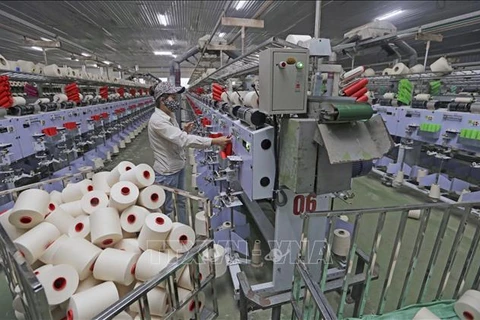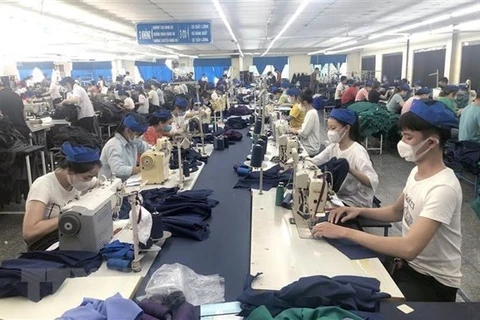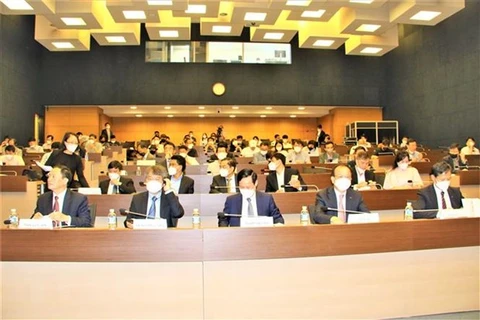Hanoi (VNA) – Vietnam has weathered the pandemic storm through a combination of strong yet flexible state leadership that won the confidence and trust of citizens, rapid and nimble response, and innovative use of technology, James Borton of the School of Advanced International Studies under Johns Hopkins University wrote in AsiaGlobal Online.
According to the expert, in early 2020 when the COVID-19 broke out, few expected Vietnam, a country with almost 100 million citizens and recognised as one of the youngest and fastest-growing economies in Southeast Asia, to emerge as a successful model for pandemic preparedness and response.
He quoted Prof. Vu Thanh Van of the Academy of Journalism and Communication in Hanoi as saying that effective policy communication and implementation led to public trust in the government and resulted in citizens’ support for and compliance with the government’s policy. The public trust in Vietnam’s government during the pandemic is a good showcase for this relationship.
James Borton also wrote that at the start of 2021, Vietnam was struck by a fourth wave of infections, propelled by the highly transmissible Omicron variant, which resulted in mandated closures of non-essential businesses and food and beverage outlets and limits on transportation services in cities including Hanoi and Ho Chi Minh City. Despite the economic hardships endured by citizens, the government’s rollout of mass vaccination, which started in March 2021, proved to be a significant pathway for the reopening of the country.
Another aspect of Vietnam’s COVID-19 response was the government’s crackdown on pandemic-related corruption. This has included criminal prosecutions for abuse of power relating to the distribution of coronavirus testing kits.
A deputy foreign minister was arrested for allegedly receiving bribes in connection with the repatriation of Vietnamese stranded abroad. By allowing instances of graft by officials to be made public, the government and the Communist Party gained the confidence and trust of citizens not just in their anti-COVID-19 efforts but also in their ongoing campaign against corruption.
The expert also said that the combination of an effective pandemic policy coupled with anti-corruption measures has spurred the economy towards expansion of 7% this year as risks from the coronavirus recede.
Vietnam has also redoubled efforts to build trade and investment partnerships abroad.
The country’s reopening and its current trajectory towards robust economic recovery may be attributed to a strong sense of community and patriotism and to the fluid and flexible yet resolute government leadership in response to the enormous challenges that the global pandemic posed. This points to the country’s emergence as a strong economic and strategic player in the region, one of ASEAN’s leading member states and a much sought-after partner in the world of great power competition, wrote James Borton./.
According to the expert, in early 2020 when the COVID-19 broke out, few expected Vietnam, a country with almost 100 million citizens and recognised as one of the youngest and fastest-growing economies in Southeast Asia, to emerge as a successful model for pandemic preparedness and response.
He quoted Prof. Vu Thanh Van of the Academy of Journalism and Communication in Hanoi as saying that effective policy communication and implementation led to public trust in the government and resulted in citizens’ support for and compliance with the government’s policy. The public trust in Vietnam’s government during the pandemic is a good showcase for this relationship.
James Borton also wrote that at the start of 2021, Vietnam was struck by a fourth wave of infections, propelled by the highly transmissible Omicron variant, which resulted in mandated closures of non-essential businesses and food and beverage outlets and limits on transportation services in cities including Hanoi and Ho Chi Minh City. Despite the economic hardships endured by citizens, the government’s rollout of mass vaccination, which started in March 2021, proved to be a significant pathway for the reopening of the country.
Another aspect of Vietnam’s COVID-19 response was the government’s crackdown on pandemic-related corruption. This has included criminal prosecutions for abuse of power relating to the distribution of coronavirus testing kits.
A deputy foreign minister was arrested for allegedly receiving bribes in connection with the repatriation of Vietnamese stranded abroad. By allowing instances of graft by officials to be made public, the government and the Communist Party gained the confidence and trust of citizens not just in their anti-COVID-19 efforts but also in their ongoing campaign against corruption.
The expert also said that the combination of an effective pandemic policy coupled with anti-corruption measures has spurred the economy towards expansion of 7% this year as risks from the coronavirus recede.
Vietnam has also redoubled efforts to build trade and investment partnerships abroad.
The country’s reopening and its current trajectory towards robust economic recovery may be attributed to a strong sense of community and patriotism and to the fluid and flexible yet resolute government leadership in response to the enormous challenges that the global pandemic posed. This points to the country’s emergence as a strong economic and strategic player in the region, one of ASEAN’s leading member states and a much sought-after partner in the world of great power competition, wrote James Borton./.
VNA

























